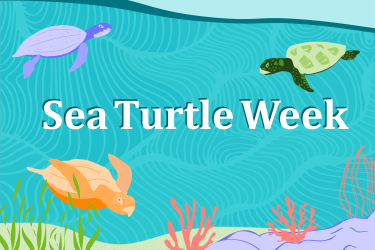Join us in celebrating Whale Week, February 12-16, 2024! Whales are among the largest and oldest animals on Earth. They can be found in every ocean and range in size from the small dwarf sperm whale to the massive blue whale, the largest animal on the planet.
At NOAA Fisheries, we work to ensure the conservation and protection of all marine mammals. This Whale Week, explore whale science and conservation through the features and videos below.
Follow along on our NOAA Fisheries social media channels and stay tuned for more content throughout the week.
Recent Whale Week Features
Recent Prescott Grants Supporting Whale Conservation Partners
Our marine mammal network partners are leveraging the Prescott Grant Program's competitive grants to improve their stranding response and investigation capabilities for whale conservation.
Help celebrate the accomplishments of the recent grant recipients
Podcast: A Game-Changing Effort for Endangered North Atlantic Right Whales
An update from our experts on the status of North Atlantic right whales, and our plans to use Inflation Reduction Act funds for right whale conservation.
Listen to the podcast on North Atlantic right whales
Video: What Does it Mean to Have Whale Sense?
Watching whales in their natural habitat is an incredible experience—but it must be done in a way that doesn't disturb or harm them. Learn how to find a whale watching company that is committed to safe and respectful whale-watching practices.
Whales and Carbon Sequestration: Can Whales Store Carbon?
Whales can help mitigate climate change impacts by storing carbon in their bodies and transporting nutrients that benefit ocean food chains.
Read more and view the infographic on whales and carbon storage
A Message from Kim Damon-Randall, Director of NOAA Fisheries Office of Protected Resources
Celebrate Whale Week 2024 with us! This week, we’re spotlighting large whale species, climate change, and what you can do to conserve whales.
Read the Whale Week 2024 leadership message
Frequent Questions—Rice’s Whales
Learn about Rice’s whales—their population status, habitat, threats, and other frequently asked questions.
Read the frequently asked questions
North Atlantic Right Whale 2024 Calving Season
Approximately 360 individuals are remaining, including about 70 reproductively active females. With so few of these whales left, researchers closely monitor the Southeast for new offspring during the annual right whale calving season.
Meet the mothers and calves of the 2024 season
Coffman Cove Residents Help Free Two Killer Whales From Barnes Lake
Citizens, fishing outfitters, sports and commercial fishermen, and local businesses volunteered time, boats, local knowledge, and hospitality.
Coffman Cove residents help free two killer whales from lake
Recent Sightings of Highly Endangered Eastern North Pacific Right Whales Raise Hope for Recovery
Four whales were spotted from the critically endangered eastern population of North Pacific right whales—at least one is new to researchers.
Researchers spot elusive eastern North Pacific right whales
Vocal Repertoire of Cook Inlet Beluga Whales Documented for the First Time
Beluga whales are highly social and vocal marine mammals. They use acoustics to find prey, navigate their environment, avoid predators, and maintain group cohesion. For Alaska’s critically endangered Cook Inlet beluga population, new research finds that these crucial communications may be masked by noise from human activities.
Read about new research on shipping noise and beluga whale calls
Whale Week Videos and Podcasts
Video: Using Tags to Understand North Atlantic Right Whales
We work with our partners to put tags on North Atlantic right whales to learn about an individual’s movement and behavior. This video captured by a tag gives a little insight into what it is like being a North Atlantic right whale.
Video: Wondrous Whales
Love whales like we do? Check out the various species of whales in the United States.
Podcast: Documenting the Elusive North Pacific Right Whale
North Atlantic right whales get a lot of attention. In this podcast episode, we learn a little about their lesser known West Coast cousins: North Pacific right whales, whose numbers are dramatically low.
Listen to the podcast on North Pacific right whales
Podcast: Checking In on Endangered Southern Resident Killer Whales
Learn the latest on endangered Southern Resident killer whales with Dr. Megan Wallen, a marine mammal specialist in NOAA Fisheries West Coast Protected Resources Division.
Listen to the podcast on Southern Resident killer whales
Whales: Did You Know?
Whales and Climate Change: Big Risks to the Ocean's Biggest Species
Climate change is impacting ocean ecosystems and resulting in many challenges for a variety of marine species, including whales.
How climate change is affecting different whale species
Go Slow—Whales Below
You can help save endangered North Atlantic right whales by slowing down to 10 knots or less in waters where they are likely present.
5 Icebreakers About Bowhead Whales
Conversation starters about an Arctic whale.
10 Wonderful Whale Facts
How much do you know about different species of whales? As we celebrate Whale Week, take a look at some interesting tidbits and see if you learn something new about these majestic creatures.
Check out 10 wonderful whale facts

















